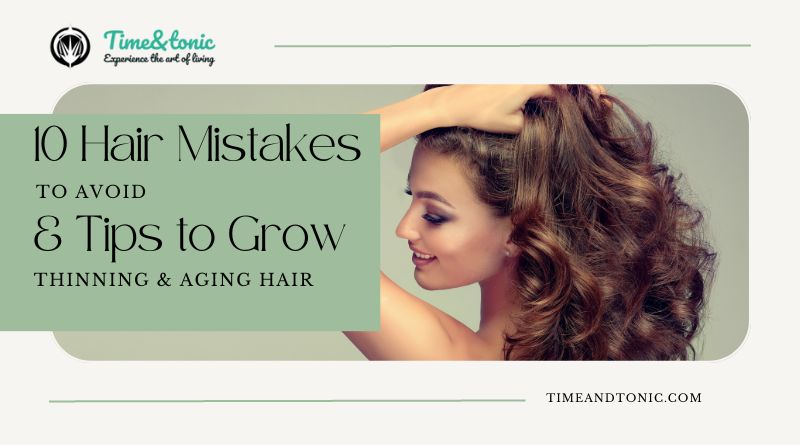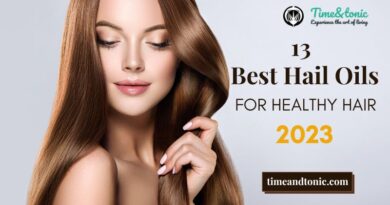Ten Hair Mistakes to Avoid & Tips to Grow Thinning & Aging Hair
Having beautiful, healthy hair is a goal shared by many, but achieving it often involves steering clear of common hair mistakes. Your hair is a crucial part of your overall appearance, and its condition can significantly impact your confidence and well-being. In this comprehensive guide, we’ll delve into some tips to grow thinning & aging hair and also discuss the critical hair mistakes you should avoid.
From excessive heat styling to neglecting regular haircuts, using harsh products, and more, we’ll explore the pitfalls that can sabotage your hair’s health and appearance. Each section will provide valuable insights and practical tips on how to sidestep these blunders, ensuring your hair remains vibrant, strong, and free from unnecessary damage.
Whether you’re a seasoned hair care enthusiast or just beginning your hair care journey, this guide is your roadmap to healthier, more beautiful hair. So, let’s embark on this journey together and learn how to avoid the most common hair mistakes, empowering you to have the hair you’ve always dreamed of.
Why Avoiding Hair Mistakes is Vital
Avoiding hair mistakes is crucial for several compelling reasons that go beyond simply wanting beautiful locks. Here’s why it’s vital to steer clear of common hair care blunders:
- Hair Health and Longevity: Just as proper nutrition is essential for overall health, proper hair care is vital for the health and longevity of your hair. When you avoid damaging practices and adopt a healthy hair care routine, you can prevent hair loss, breakage, and other issues that can shorten the lifespan of your hair.
- Cost Savings: Hair treatments and products for repairing the damage can be expensive. By avoiding hair mistakes, you can save money on these treatments and invest it in preventive care instead, such as quality hair products or regular salon visits for maintenance.
- Self-Confidence: Healthy, well-maintained hair can boost your self-confidence and self-esteem. When your hair looks and feels good, you’re more likely to feel positive about your appearance, which can have a significant impact on your overall well-being.
- Professional and Social Impact: Your hair plays a role in the impression you make on others. In professional settings, well-groomed hair can contribute to a polished and put-together look. Socially, it can enhance your attractiveness and make you feel more comfortable in various social situations.
- Prevention of Hair Problems: Avoiding common hair mistakes helps prevent a wide range of hair problems, including split ends, excessive hair loss, dryness, and dandruff. Prevention is often easier and more effective than trying to treat these issues after they arise.
- Time and Effort: Repairing damaged hair can be a time-consuming and frustrating process. By avoiding mistakes, you can save yourself the hassle of trying to salvage your hair and instead focus on maintaining its health and vitality.
Click Here: 6 Reasons for Hair Breakage That You Must Keep In Mind
10 Common Hair Mistakes to Avoid
Overwashing

Overwashing your hair by shampooing too frequently can strip away its natural oils, leaving it dry, brittle, and prone to breakage. To maintain healthy hair, limit washing to 2-3 times a week, or adjust based on your hair type and activity level. Use a sulfate-free shampoo suitable for your hair’s specific needs to minimize damage.
Overwashing can disrupt the scalp’s natural balance, potentially leading to issues like excess oil production or dandruff as it tries to compensate for lost moisture. By reducing the frequency of washing, you can retain your hair’s natural oils, which help keep it moisturized and looking its best.
Using hot water

Using hot water for hair washing can harm your strands. High temperatures can strip away natural oils, leaving your hair dry and prone to frizz. To maintain healthy locks, opt for lukewarm to cool water when shampooing and rinsing. This helps preserve moisture, shine, and the overall condition of your hair.
Using harsh shampoos

Harsh shampoos containing sulfates and chemicals can be detrimental to your hair. They can strip away natural oils, leading to dryness, breakage, and scalp irritation. To protect your hair, opt for sulfate-free and gentle shampoos that suit your hair type. These milder options effectively cleanse without causing unnecessary damage, leaving your hair healthier and more manageable.
Skipping conditioner

Skipping conditioner is a common hair mistake. Conditioner is essential for maintaining hair health as it moisturizes, detangles, and adds shine. When you skip conditioner, your hair can become dry, brittle, and more prone to breakage.
To keep your locks in good condition, use conditioner regularly, applying it from mid-length to the ends while avoiding the roots if you have fine or oily hair. This simple step can make a significant difference in the overall health and appearance of your hair.
Using excessive heat

Excessive heat styling with tools like flat irons, curling irons, and blow dryers can damage your hair. Frequent exposure to high temperatures can lead to dryness, split ends, and breakage. To protect your hair, limit heat styling to a few times a week, and always use a heat protectant spray before applying heat.
Choose lower heat settings when possible and give your hair breaks from heat styling to allow it to recover and maintain its natural health and shine. Consider alternative, heatless styling methods to reduce the overall stress on your hair.
Tight hairstyles

Tight hairstyles, like tight ponytails or braids, can cause damage to your hair. Constant tension and pulling can lead to hair breakage and even hair loss, a condition called traction alopecia. To maintain healthy hair, opt for looser hairstyles that don’t put excessive stress on your scalp and hair follicles.
If you frequently wear tight styles, be sure to give your hair breaks and avoid pulling hair too tightly. Using soft hair ties and avoiding excessive twisting or braiding can also help prevent damage caused by tight hairstyles. Prioritizing your hair’s health over style is key to avoiding long-term damage.
Ignoring split ends

Ignoring split ends can lead to more significant hair damage. Split ends occur when the hair shaft splits into two or more fragments, and if left untreated, they can travel up the hair, causing more breakage and frizz. Regular trims every 6-8 weeks help prevent split ends and keep your hair looking healthy and well-maintained.
Additionally, using products designed to seal split ends temporarily can provide a quick fix. However, the best approach is to trim split ends promptly to maintain the overall integrity and appearance of your hair, promoting its growth and strength.
Using the wrong hairbrush

Using the wrong hairbrush can damage your hair. Brushes with stiff bristles or improper design can cause breakage, tangles, and frizz. To avoid this mistake, choose a brush or comb that suits your hair type and needs. For detangling wet hair, use a wide-tooth comb or a brush with soft, flexible bristles. If you have fine hair, opt for brushes with natural bristles, while thicker hair benefits from nylon bristles.
Additionally, consider the purpose of the brush, like a round brush for styling or a boar bristle brush for distributing natural oils. Using the right brush minimizes damage and helps maintain the health and shine of your hair.
Overusing hair products

Overusing hair products can weigh down your hair, making it appear greasy and dull. Excessive styling products such as gels, mousses, or hairspray can also lead to product buildup, which can be hard to remove and may affect hair health. To avoid this mistake, use hair products sparingly, following the recommended amounts on the packaging.
Tailor your product usage to your hair type and style. If you notice buildup, consider using a clarifying shampoo occasionally to remove residue. Keeping product use in check allows your hair to breathe and maintains its natural volume and texture.
Neglecting scalp health

Neglecting scalp health can lead to various hair problems. A healthy scalp provides the foundation for strong, vibrant hair growth. To avoid this mistake, ensure regular cleansing to remove dirt and excess oil. Gentle massages with a scalp-friendly shampoo can promote circulation and reduce dandruff.
Avoid excessive scratching, which can damage the scalp and hair follicles. Pay attention to any signs of irritation, dryness, or redness, as these may indicate underlying issues. A balanced diet, rich in nutrients and hydration, also supports scalp health. Prioritize scalp care to maintain the overall well-being of your hair and prevent conditions like dandruff, itchiness, and hair loss.
Why is hair thinning a concern?
Hair thinning is a concern for many people due to several reasons, both cosmetic and emotional. Understanding why hair thinning is a concern helps individuals appreciate the importance of addressing it:
- Cosmetic Appearance: One of the most immediate concerns associated with hair thinning is its impact on physical appearance. Thinning hair can make individuals look older than their actual age, which can affect their self-esteem and self-image. People often associate thick, healthy hair with youth and vitality.
- Loss of Confidence: Hair is a significant part of a person’s identity and self-esteem. When hair starts thinning, individuals may experience a loss of confidence and may become self-conscious about their appearance. This can affect their social interactions and overall quality of life
- Psychological Impact: Hair loss can have a profound psychological impact, leading to feelings of anxiety, depression, and even isolation. Individuals may become preoccupied with their hair loss, leading to emotional distress.
- Social and Professional Life: Hair thinning can impact an individual’s social and professional life. It may affect their willingness to participate in social activities, attend social gatherings, or even go out in public. In professional settings, hair thinning can influence self-assurance during job interviews and interactions with colleagues and clients.
- Relationships: Changes in appearance due to hair thinning can also affect personal relationships. Some individuals may worry about how their partners perceive them, leading to strain in relationships.
- Perceived Health: Hair is often seen as an indicator of overall health. Hair thinning can raise concerns about underlying health issues, even if it’s primarily due to genetic or hormonal factors.
- Limited Styling Options: As hair thins, individuals may find it challenging to style their hair the way they used to. This limitation in styling options can contribute to frustration and dissatisfaction.
- Financial Concerns: Over time, individuals may spend significant amounts of money on products and treatments to address hair thinning, which can be a financial burden.
You May Also Like: Top 10 Stylish Haircuts for Thin & Aging Hair
5 Mistakes you should avoid if you have thinning hair
Thinning hair can result from various factors, such as hormonal shifts post-partum or during menopause. While it’s typically a temporary issue, it can be quite distressing for those experiencing it.
While there is a wealth of guidance available on what steps to take when dealing with hair loss, including consulting with a healthcare provider or trichologist for expert advice, we aim to highlight what individuals with thinning hair should avoid once they notice the issue.
In the following, leading hair professionals and trichologists share insights on what individuals with thinning hair should steer clear of.
Mistake #1. Sleeping on a cotton pillow might aggravate hair loss.

It’s advisable to avoid sleeping on a pillowcase made of traditional cotton fabric since it can be rough on your hair.
Instead, consider using a pillowcase with a silk finish. This choice is gentler on your hair while you sleep because it reduces friction and minimizes hair breakage.
While silk pillowcases can be on the expensive side, there is a cost-effective solution. You can opt for a pillowcase that features silk on one side, which provides some of the benefits without the high price tag.
For example, LilySilk offers a pillowcase made from 100% Mulberry silk, available in an array of stylish colors. Another option to explore is using a silk hair wrap, which can also help protect your hair while you sleep. This way, you can maintain the health of your hair without breaking the bank.
LILYSILK Natural Silk Pillowcase
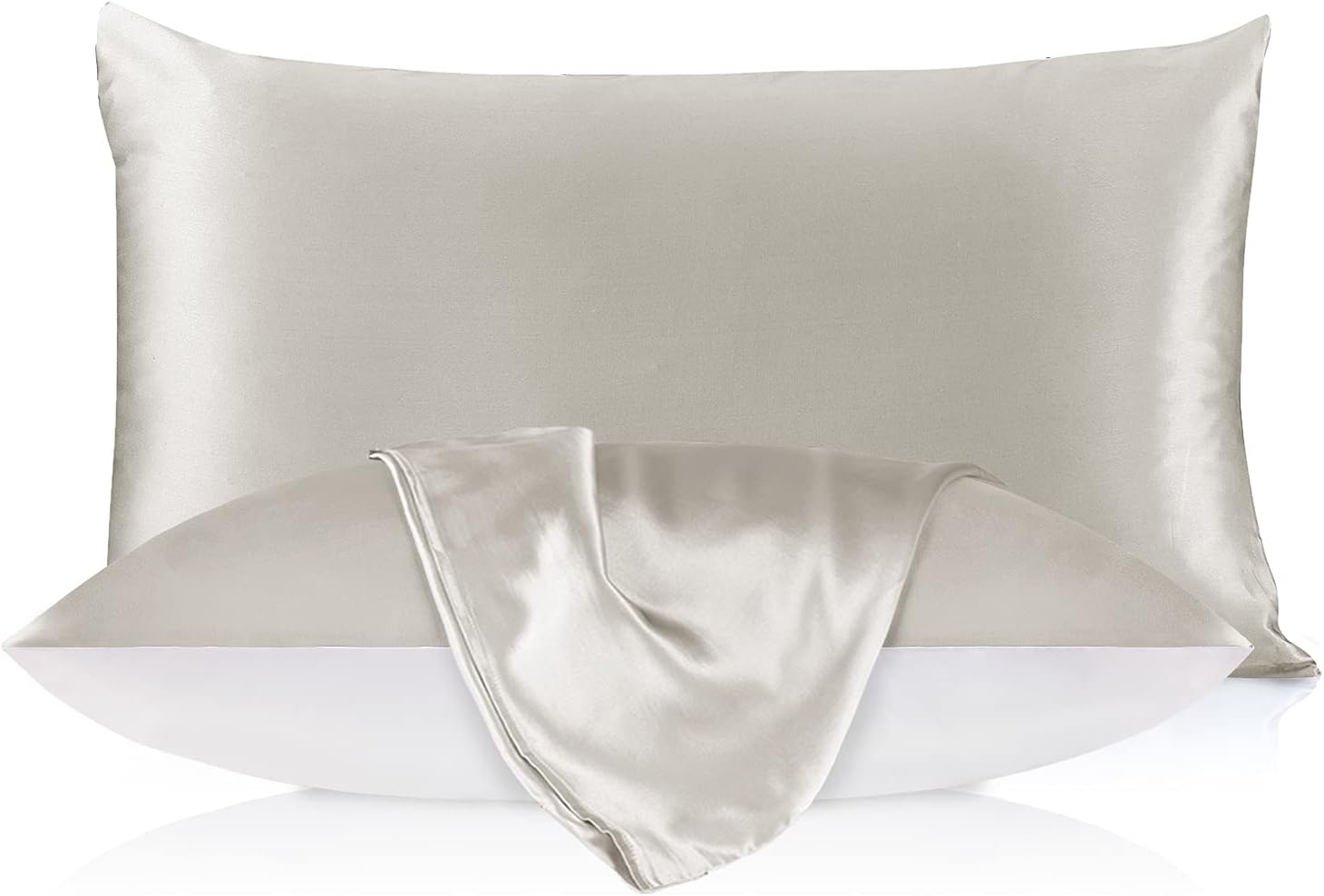
- Brand: LilySilk
- Material: Silk
- Size: Standard 20”x26”
- Product Dimensions: 26″L x 20″ W
- Color: Silver gray
Mistake #2. Thin hair should avoid a damp appearance.

Steer clear of using wet-look hair products like mousse or gel as they tend to cause the hair to appear separated, making it look sparse and thin. Instead, if you require some hold for your hairstyle, consider using a minimal amount of mousse on damp hair before proceeding to blow-dry it.
Exercise caution when using hairspray as well. Ensure that you spray it from a distance of approximately 10 to 12 inches away from your head. This distance is important because it prevents the hair from becoming excessively wet due to the spray and also prevents the hair from clumping together, which can expose patches of the scalp. By maintaining the right distance while applying hairspray, you can achieve the desired hold without compromising the appearance of your hair’s thickness.
Mistake #3. Too tight hair ties contribute to hair loss.

Certain hairstyles can exert excessive tension on your hair strands, potentially leading to breakage, especially in the area around your hairline, which is a common spot for visible thinning.
Avoid the practice of securing your hair with tight hair bands or firmly pulling it back using clips, as this can be detrimental to your hair’s health. Instead, opt for a more gentle approach by tying your hair into a loose, low bun. This style is less likely to cause strain on your hair and can give the appearance of thicker hair.
Additionally, consider switching to silk or satin scrunchies or invisibles for tying your hair. These hair accessories are less abrasive than traditional elastics and can help prevent damage while maintaining your hair’s overall health and thickness. Making these small adjustments in your hairstyling routine can go a long way in preserving the integrity of your hair, particularly if you’re concerned about thinning.
Mistake #4. Harsh treatment might cause hair to fall out.

Many people tend to be rougher with their hair than they are with their skin, but individuals dealing with thinning hair should avoid harsh styling practices.
Avoid using rough techniques such as aggressively combing through your hair or using the highest heat setting on your hairdryer. Hair that is thinner is inherently more fragile and prone to breakage.
Heat styling can also pose a challenge. Whenever possible, allow your hair to air dry naturally. If that’s not an option, consider lowering the temperature on your hairdryer or straightening iron, and always use a heat protection product to shield your hair from damage.
When using a hairdryer, refrain from continuously running a brush through your hair, as this can exert pressure on the roots, potentially exacerbating hair thinning. Instead, opt for a different approach by roughly drying your hair until it’s nearly dry, and then use a brush sparingly at the end to finish your styling.
It’s worth noting that older hairdryers or those that have seen a lot of use may lack proper temperature control. If the heat is too much for your scalp, it’s also too harsh for your hair. Investing in a high-quality hairdryer can be a wise choice, as it not only helps protect your hair but also reduces styling time.
Mistake #5. Hair loss is affected by an excessively restricted diet.

Maintaining a healthy and nutritious diet is essential for overall well-being, and it becomes even more crucial when you’re dealing with hair loss.
It’s important not to skimp on essential nutrients, especially protein, and avoid following fad diets that might deprive your body of vital nourishment. A balanced diet provides your body with the necessary building blocks for healthy hair growth, and cutting corners in your nutrition can exacerbate hair loss issues.
A poor diet can certainly worsen hair loss, as your hair follicles require a consistent supply of nutrients to function optimally. By prioritizing a well-rounded, nutrient-rich diet, you not only support your hair health but also contribute to your overall vitality and well-being. So, focus on providing your body, and your hair, with the nourishment they need to thrive.
Quick Link: The Ultimate Guide to the Best Foods for Hair Growth
Effective Tips to Speed Up Hair Growth After Thinning
Hair thinning can be a distressing experience for both men and women, affecting not just our appearance but also our self-confidence. However, the good news is that there are effective ways to speed up hair growth after thinning. Whether your hair loss is due to genetics, age, or external factors, this section is here to help you reclaim the lush, vibrant locks you once had.
Maintain a Healthy Diet

A healthy diet is essential for hair growth. Consume a variety of nutrient-rich foods, including fruits, vegetables, lean proteins, whole grains, and healthy fats. Focus on foods high in vitamins like biotin (found in eggs, nuts, and sweet potatoes), vitamin E (in almonds and spinach), and vitamin A (in carrots and sweet potatoes). Ensure an adequate intake of protein from sources like lean meats, fish, and legumes, as it’s crucial for hair structure.
Stay hydrated by drinking plenty of water. Minimize processed foods, sugary snacks, and excessive caffeine, as they can negatively impact hair health. Balanced nutrition contributes to stronger, faster-growing hair.
Stay Hydrated

Staying hydrated is vital for overall health, including the health of your hair. Water is essential for transporting nutrients to the hair follicles and maintaining the elasticity of the hair shaft. Dehydration can lead to dry, brittle hair and even hair loss.
To stay hydrated, aim to drink at least 8-10 glasses (about 2 liters) of water daily, but adjust based on your activity level and climate. Additionally, consume hydrating foods like fruits and vegetables with high water content, such as watermelon, cucumber, and oranges.
Avoid excessive caffeine and alcohol consumption, as they can contribute to dehydration. Monitor your body’s signals for thirst and drink water regularly throughout the day. Proper hydration not only supports hair health but also benefits your overall well-being.
Scalp Care

Scalp care is essential for maintaining healthy hair. Regularly massage your scalp to stimulate blood circulation, which nourishes hair follicles and encourages growth. You can use natural oils like coconut, jojoba, or olive oil for added benefits.
Choose a mild, sulfate-free shampoo suitable for your hair type. Avoid frequent washing to prevent stripping natural oils. Incorporate deep conditioning treatments to keep your scalp and hair moisturized and prevent dryness or flakiness.
If you have specific scalp issues like dandruff or itchiness, use specialized products designed to address these concerns. Avoid excessive use of styling products, as they can clog pores and affect scalp health.
Maintaining a clean, balanced scalp environment is key to promoting strong and vibrant hair.
Avoid Over styling

Overstyling your hair can lead to damage and thinning. Excessive use of heat-styling tools like straighteners, curling irons, and blow dryers can weaken hair and cause breakage. Try to air dry your hair whenever possible, and use these tools sparingly, with a heat protectant spray.
Avoid tight hairstyles like tight ponytails or braids, as they can pull on the hair shaft and lead to hair loss. Instead, opt for looser, gentler hairstyles.
Minimize the use of chemical treatments, such as perms, relaxers, and frequent coloring, as these can weaken and damage hair. If you do use them, ensure proper care and conditioning to minimize harm.
Give your hair regular breaks from styling and use products designed to protect and nourish your hair. Prioritizing gentle treatment and allowing your hair to recover can help maintain its thickness and health.
Hair Care Routine

Maintaining a consistent hair care routine is crucial for healthy, thick hair:
- Shampoo and Conditioner: Use a suitable, sulfate-free shampoo and conditioner for your hair type. Wash your hair as needed (usually every 2-3 days) to avoid over-cleansing, which can strip natural oils.
- Deep Conditioning: Apply a deep conditioning treatment once a week to keep your hair hydrated and prevent breakage. Leave it on for the recommended time.
- Gentle Drying: Pat your hair dry with a soft towel; avoid vigorous rubbing. Air-dry when possible to minimize heat damage.
- Heat Protection: Use heat-protectant products before styling with hot tools like curlers or straighteners.
- Brushing: Use a wide-tooth comb or a brush designed for your hair type to prevent breakage.
- Regular Trims: Trim your hair every 6-8 weeks to remove split ends and maintain healthy hair.
- Minimize Chemicals: Limit the use of harsh chemicals and dyes to prevent damage.
- Healthy Lifestyle: Stay hydrated, eat a balanced diet, manage stress, and get adequate sleep for overall hair health.
- Protective Styles: Use protective hairstyles to minimize stress on your hair and scalp.
- Consult a Professional: Seek advice from a hairstylist or dermatologist if you have specific concerns or issues with hair thinning or loss.
Trim Your Hair Regularly

Regular hair trims are essential for maintaining healthy hair. Trimming every 6-8 weeks helps prevent split ends and breakage, and promotes overall hair health. Here’s why it’s important:
- Split End Prevention: Trimming removes split ends, preventing them from traveling up the hair shaft and causing further damage.
- Hair Health: It encourages the growth of strong, thick hair by eliminating damaged and weakened portions.
- Manageable Length: Regular trims help you maintain the desired length and style of your hair.
- Appearance: It keeps your hair looking fresh, vibrant, and well-groomed.
- Prevents Tangling: Split ends and damaged hair are more prone to tangling. Trimming minimizes tangling and makes your hair easier to manage.
- Boosts Confidence: Healthy-looking hair can boost your self-confidence and overall appearance.
Don’t wait until your hair is visibly damaged to get a trim. Consistent maintenance helps prevent problems and promotes the long-term health and beauty of your hair.
Reduce Stress

Reducing stress is crucial for overall well-being, including hair health. Chronic stress can contribute to hair thinning and loss. Here’s how to reduce stress:
- Exercise: Engage in regular physical activity like walking, yoga, or meditation. Exercise releases endorphins, which help reduce stress.
- Healthy Diet: Consume a balanced diet rich in nutrients to support your body and reduce the impact of stress.
- Sleep: Ensure you get enough quality sleep, as lack of sleep can increase stress levels. Maintain a regular sleep schedule.
- Breathing Exercises: Practice deep breathing techniques to calm your mind and relax your body when you feel stressed.
- Time Management: Organize tasks, set realistic goals, and prioritize activities to reduce stress from overwhelming responsibilities.
- Hobbies: Engage in enjoyable hobbies or activities that you’re passionate about to relax and unwind.
- Social Support: Connect with friends and family for emotional support and social interaction.
- Professional Help: If stress becomes unmanageable, consider speaking with a therapist or counselor.
Reducing stress not only benefits your hair but also improves your overall quality of life.
Find More: Top 10 Hair Straightening Treatments: A Comprehensive Guide
Supplements

Supplements can complement your diet to support overall health and hair growth. Consult a healthcare professional before starting any supplement regimen. Here are some supplements that may help:
- Biotin: Biotin is a B vitamin that supports hair and nail growth. It’s often found in hair supplements and can be beneficial if you have a biotin deficiency.
- Collagen: Collagen supplements may promote hair thickness and strength by supporting the structure of hair follicles.
- Omega-3 Fatty Acids: Fish oil or flaxseed oil supplements provide omega-3s, which can help reduce inflammation and support scalp health.
- Vitamin D: Adequate vitamin D levels are linked to healthy hair growth. Supplements may be beneficial if you have a deficiency.
- Iron: Iron deficiency can cause hair loss. Iron supplements may help if recommended by a healthcare provider.
- Zinc: Zinc supports hair growth and repair. It can be beneficial if you have a zinc deficiency.
Remember that supplements should not replace a balanced diet, and excessive intake can have adverse effects. Focus on a healthy diet first, and use supplements as needed and under professional guidance.
Avoid Smoking and Excessive Alcohol Consumption

Avoiding smoking and excessive alcohol consumption is not only beneficial for your overall health but also plays a significant role in maintaining healthy hair:
- Smoking: Smoking restricts blood flow, reducing the amount of oxygen and nutrients that reach hair follicles. This can weaken hair and contribute to hair loss. Quitting smoking can improve your hair’s health and overall appearance.
- Alcohol: Excessive alcohol intake can lead to dehydration, which can make hair more brittle and prone to breakage. It can also deplete essential nutrients needed for healthy hair growth. Moderation is key, and drinking plenty of water alongside alcohol can help mitigate its effects.
By quitting smoking and limiting alcohol consumption, you not only support your hair’s health but also promote a healthier lifestyle with numerous benefits for your overall well-being.
Patience

Practicing patience is crucial when aiming to achieve any long-term goal, including hair growth. Here’s why it matters:
- Natural Process: Hair growth is a natural process with a predetermined growth rate. Expecting immediate results can lead to disappointment.
- Healthy Growth: Rushing hair growth through excessive treatments or products can harm your hair and scalp. Patience allows for gradual, healthy growth.
- Reduced Stress: Impatience can lead to stress, which can, in turn, exacerbate hair issues. Being patient promotes a stress-free environment for your hair to thrive.
- Consistency: Patience helps you maintain a consistent hair care routine, which is essential for long-term hair health.
- Embracing Change: Embrace your hair’s natural texture and growth pattern. Patience allows you to work with what you have, making the journey more enjoyable.
Remember, everyone’s hair grows at a different rate, and there are no instant solutions. Be patient, stay committed to your hair care routine, and you’ll gradually see the results you desire.
The 7 Best Hair Growth Shampoos
Are you dreaming of voluminous, healthy hair that turns heads wherever you go? You’re not alone! Many people desire thicker, more vibrant hair, and the good news is that it’s achievable with the right hair growth shampoo. In this comprehensive guide, we’ll introduce you to the 7 Best Hair Growth Shampoos that can help you on your journey to luxurious locks.
Rosemary Oil Shampoo
Majestic Pure Rosemary Hair Loss Shampoo
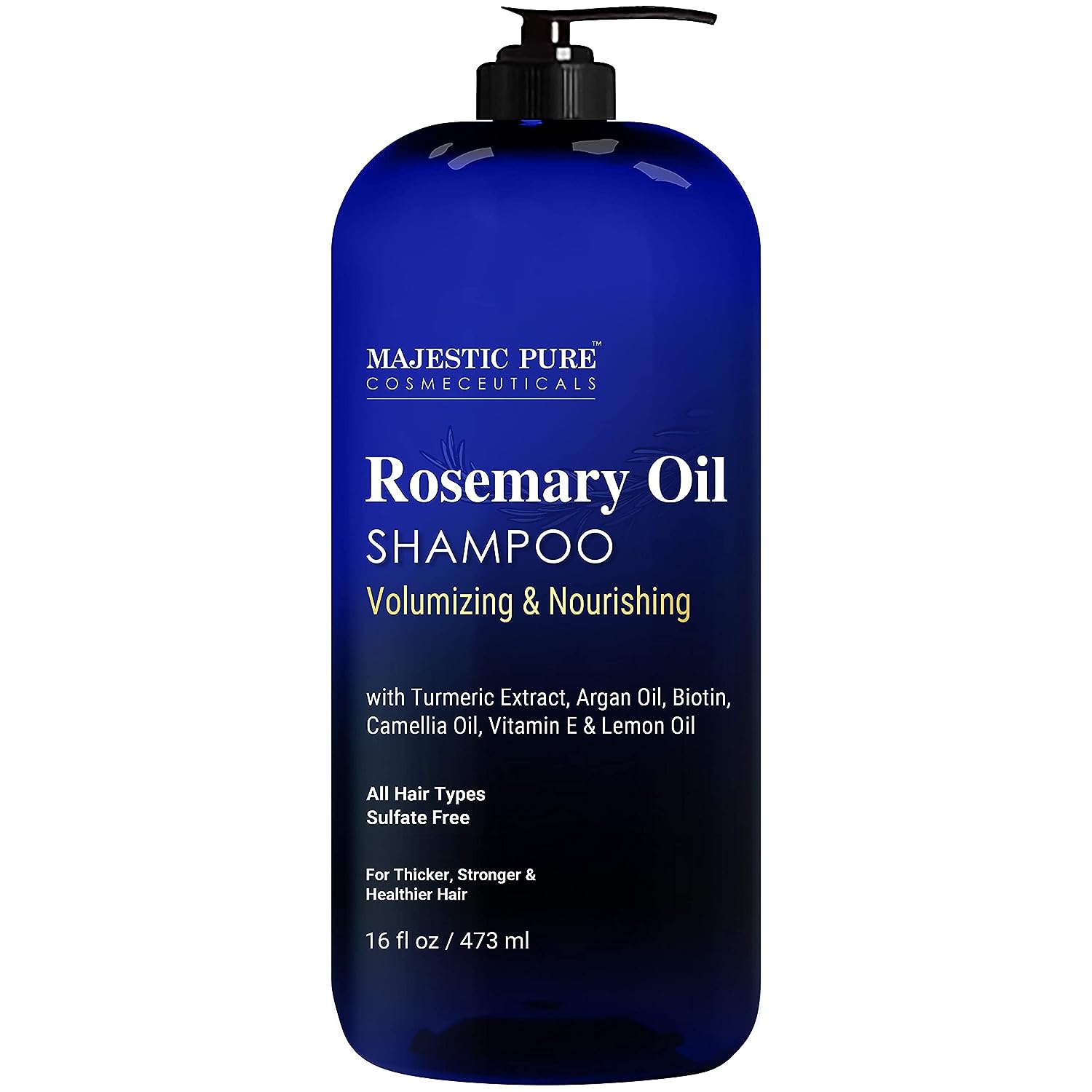
- Brand: MAJESTIC PURE
- Scent: Rosemary
- Item Weight: 16 Ounces
- Item Form: Oil
- Active Ingredients: Vitamin_e
Rosemary oil has long been celebrated for its ability to promote hair growth and improve scalp health. Shampoos infused with rosemary oil as a key ingredient can invigorate hair follicles, leading to thicker and healthier strands.
Biotin Shampoo
Volumizing Biotin Shampoo for Thinning Hair
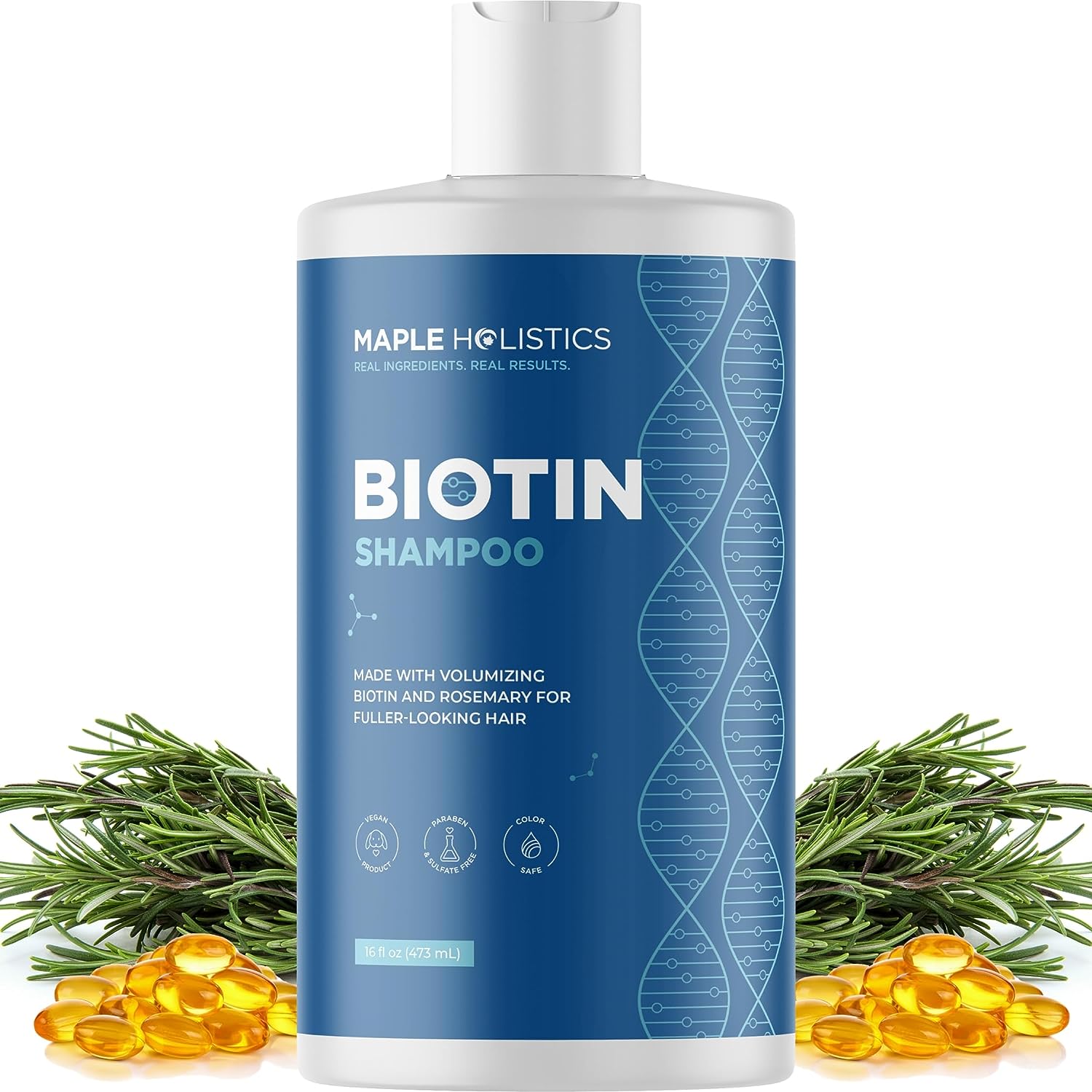
- Brand: Maple Holistics
- Scent: Sandalwood
- Item Weight: 16 Ounces
- Item Form: Liquid
- Active Ingredients: Coconut oil, rosemary
Biotin, a B vitamin essential for healthy hair growth, plays a crucial role in maintaining strong locks. Shampoos enriched with biotin help strengthen hair and reduce breakage, leaving you with more resilient and lush tresses.
Nioxin System Kit
Nioxin System Kits, Cleanse, Condition, Hydrate Sensitive or Dry Scalp
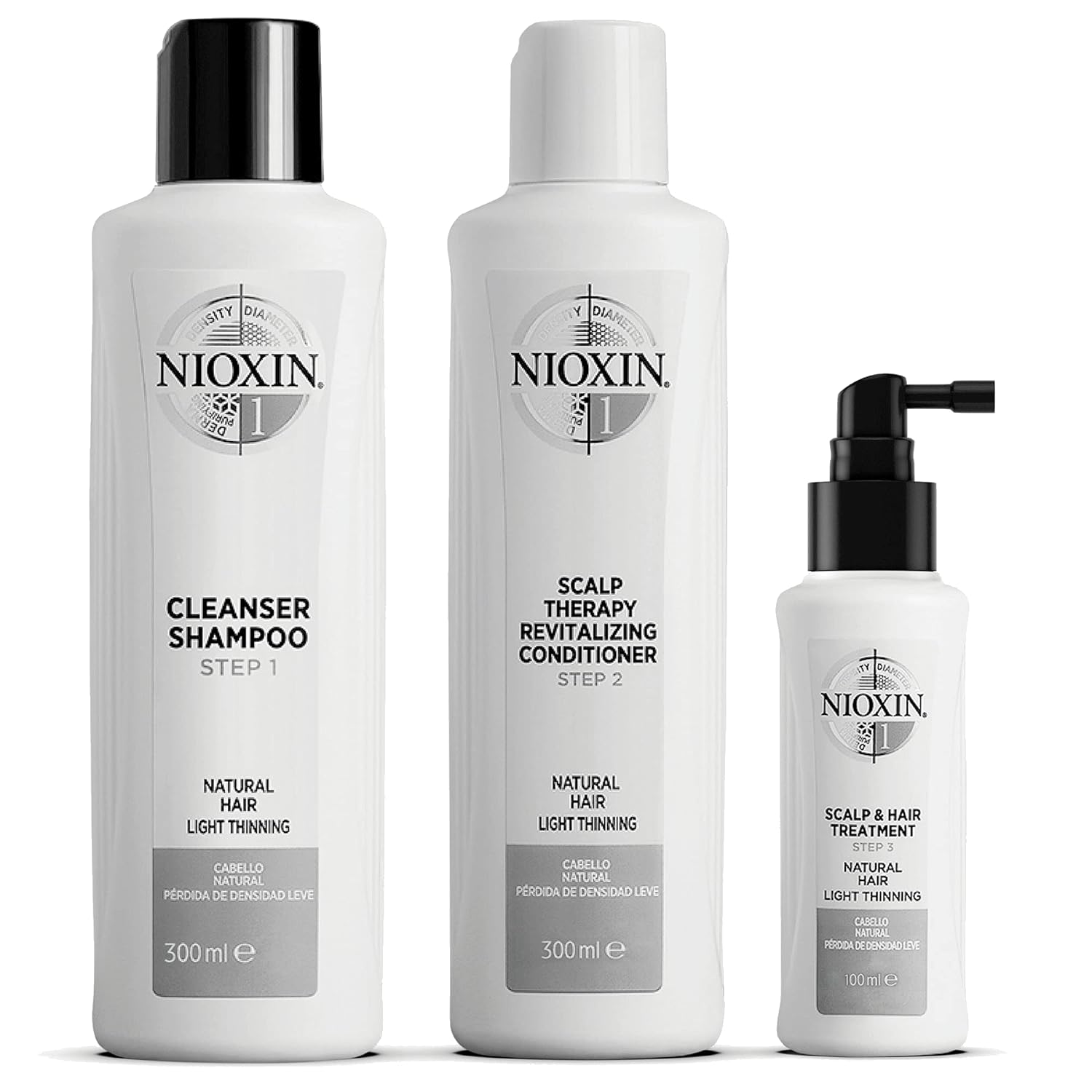
- Product Benefits: REDUCES HAIR LOSS due to breakage and strengthens hair, while refreshing the scalp and delivering a healthy shine.REDUCES HAIR LOSS due to breakage and strengthens hair, while refreshing the scalp and delivering a healthy shine.
- Item Form: Liquid
- Brand: Nioxin
- Hair Type: Thinning
- Scent: Peppermint
Nioxin is a well-known brand revered for its hair growth products. The Nioxin System Kit, consisting of a shampoo, conditioner, and scalp treatment, is designed to provide a comprehensive solution for hair growth. It cleanses, conditions, and nourishes your scalp, promoting optimal conditions for hair regrowth.
Hair Surge Caffeine Shampoo
Ultrax Labs Hair Growth Shampoo
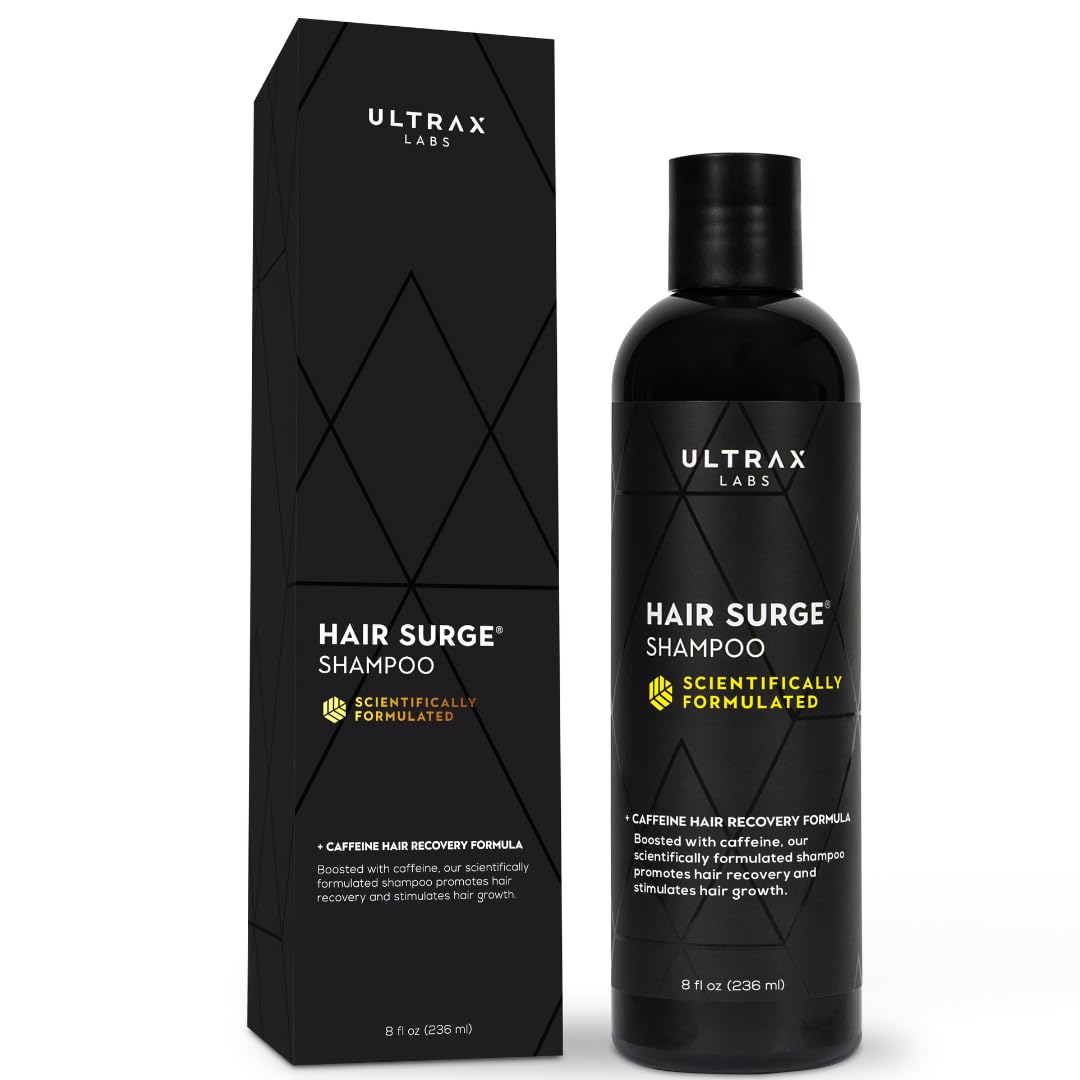
- Brand: Ultrax Labs
- Scent: Natural
- Item Weight: 8 Ounces
- Item Form: Cream
- Active Ingredients: Caffeine, Menthol
Caffeine, not just for your morning coffee, can also be a hair growth stimulant. Hair Surge Caffeine Shampoo is specifically formulated to target hair follicles, promoting healthy growth and preventing hair loss. It’s like an energy boost for your hair!
Pura D’or Anti-Hair Loss Shampoo
Pura D’or Anti-Hair Loss Shampoo
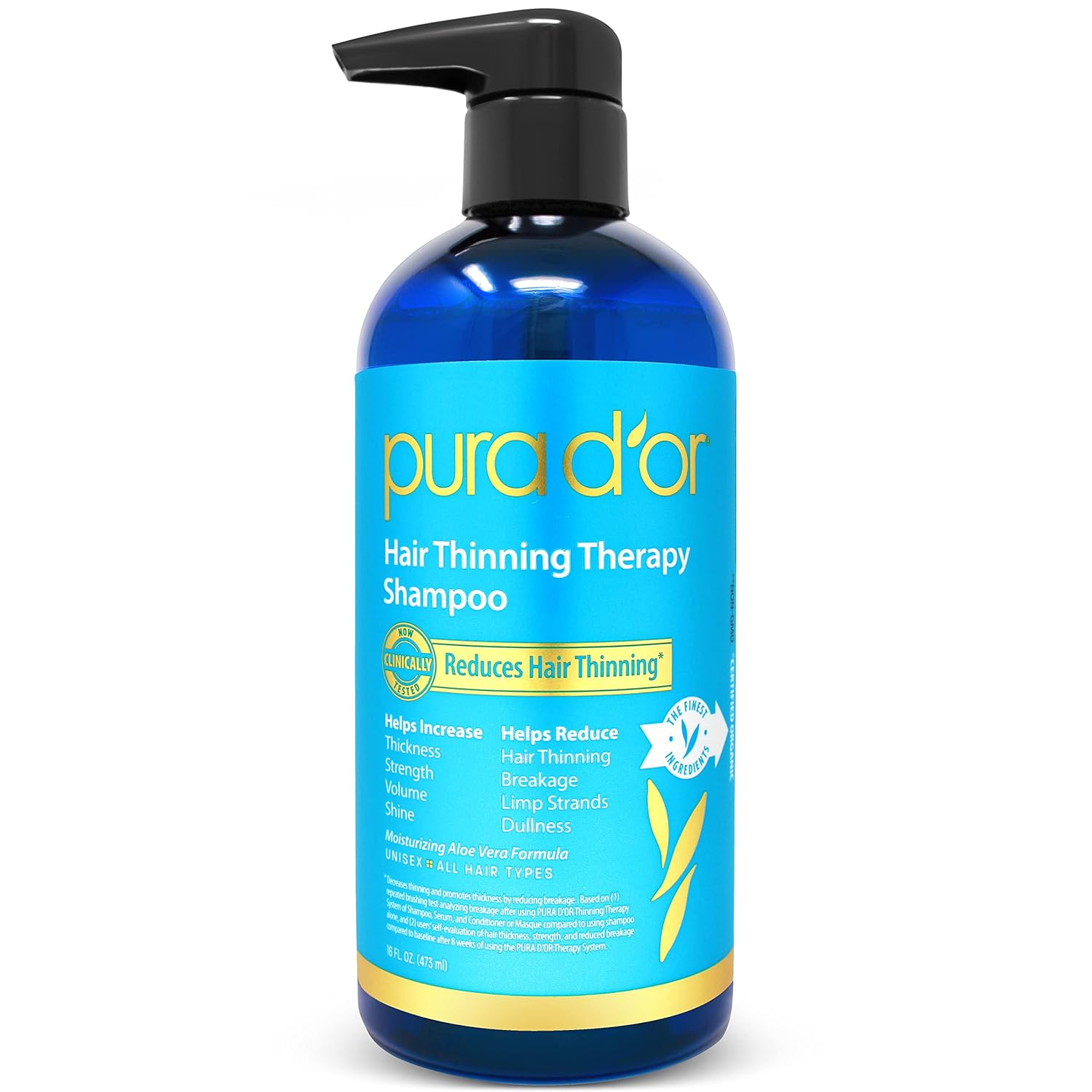
- Brand: PURA D’OR
- Scent: Herbal
- Item Weight: 0.45 Kilograms
- Item Form: Liquid
- Active Ingredients: Herbal DHT Blockers, Vitamin_e
Pura D’or Anti-Hair Loss Shampoo harnesses the power of nature to combat hair loss. This formula blends natural ingredients such as biotin, saw palmetto and nettle extract to stimulate hair growth and reduce hair loss effectively.
Art Naturals Organic Argan Oil Hair Loss Shampoo
Art Naturals Organic Argan Oil Hair Loss Shampoo

- Aloe Vera Green Tea Lavender Helps Fight
- DHT Paraben-Free
- Sulfate-Free
- Professional Series Gentle formula formulated with an organic blend of argan oil – vitamin B complex
Argan oil is celebrated for its moisturizing and nourishing properties. Art Naturals Organic Argan Oil Hair Loss Shampoo combines the benefits of argan oil with other hair-loving botanical extracts, leaving your locks hydrated, silky, and on the path to growth.
Maple Holistics Biotin Shampoo for Hair Growth
Maple Holistics Biotin Shampoo for Hair Growth
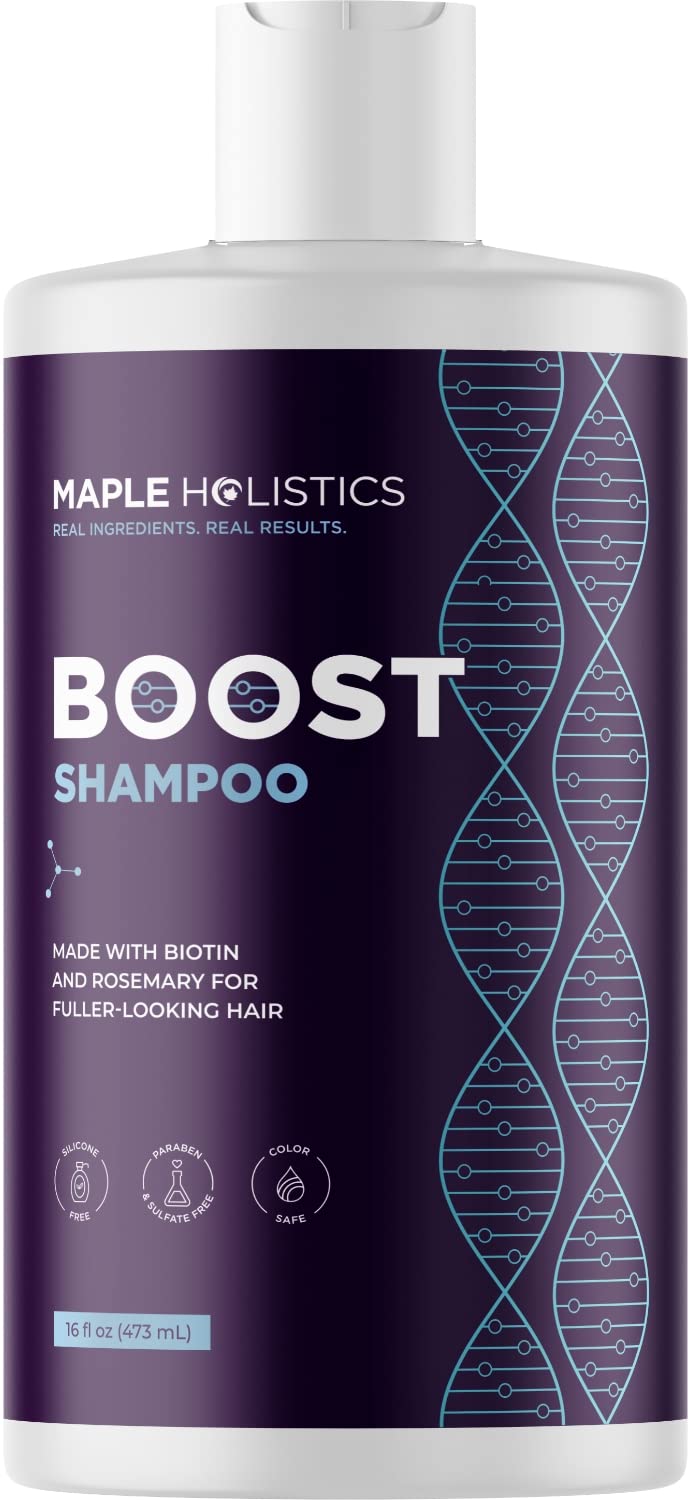
- Brand: Maple Holistics
- Scent: Citrus
- Item Form: Liquid
- Active Ingredients: Acrylates, caffeine, Cocamidopropyl betaine, glycerin, panthenol, rosemary, sodium PCA
- Material Type Free: Sulfate-free, Paraben Free
Maple Holistics Biotin Shampoo is a nourishing elixir for your hair. Infused with biotin, provitamin B5, and botanical extracts, this shampoo provides the essential nutrients your hair needs for healthy growth.
Bottom Line
In the pursuit of healthier, thicker, and more vibrant hair, it’s essential to steer clear of common hair mistakes and adopt smart strategies to promote growth, especially if you’re dealing with thinning and aging hair. By avoiding harsh styling, embracing nourishing habits, and seeking professional advice when needed, you can work towards achieving the luscious locks you desire. When it comes to hair maintenance, keep in mind that persistence and patience are essential.
FAQs
To prevent hair breakage and thinning, avoid tight hairstyles, minimize heat styling, use gentle hair care products, and maintain a healthy diet.
Include protein-rich foods, biotin sources, and plenty of fruits and vegetables in your diet to support hair growth.
While you can’t completely reverse natural age-related hair thinning, you can slow it down with proper care, lifestyle adjustments, and sometimes, medical treatments.
Trimming your hair every 6-8 weeks can help remove split ends and prevent breakage, promoting healthier hair growth.
Hair supplements or vitamins may aid in hair health, but it’s important to consult with a healthcare professional before starting any new supplements to ensure they are appropriate for your specific needs.

